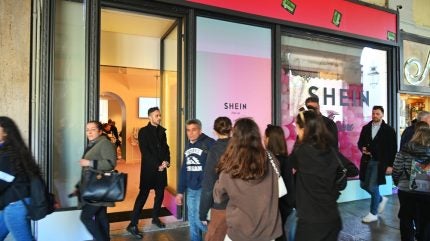
Shein Exchange, described as an integrated online peer-to-peer resale platform to buy and sell previously owned Shein products, is launching a phased entry into three marketplaces.
Users in France will be the first to access the Shein Exchange platform, with the resale platform being made available in the UK and Germany in subsequent phases.
Shein Exchange can be accessed directly through Shein’s app, simplifying the product resale process through a “streamlined interface” that pre-populates a list of the customer’s previous purchases with a button next to each that says “sell” – making the listing of products a quick and easy process.
Similarly, customers looking to explore pre-loved styles can use the search and filter tools within the platform to create more targeted search results of the pre-loved items available for sale.
Shein explained that in a series of studies conducted in September 2023, its customers indicated a “strong desire to integrate circular practices” into their daily lives, with clothing donation and peer-to-peer resale online emerging as the respondents’ top two ways of participating in the circular fashion ecosystem.
The study, which surveyed 3,500 customers across the US, Brazil, Mexico, the UK, France and Germany to understand Shein customer preferences on engaging with circularity, also found that nearly half of the respondents from the UK, France, Germany, and Brazil were motivated to buy second-hand clothing online because of their shared commitment to sustainability and circular fashion.
This announcement follows the launch of Shein’s resale platform in the US earlier in October 2022.
Shein highlighted that since its launch, the platform has continued to attract new users and listings. In 2023, over 4.2 million new users reportedly signed up to join the Shein Exchange platform in the US, with over 115,000 pre-owned items listed for sale by over 95,000 unique sellers.
Shein’s director of sustainability, Caitrin Watson, believes as a member of the World Circular Textiles Day community, the brand understands that there is a lot of work to be done to achieve a fully circular textile future by 2050.
Watson said: “With the extension of our Shein Exchange platform into Europe and the UK, we hope to provide more of our global customer community with ways to easily participate in the circular economy and promote the environmental benefits of shopping second hand rather than buying new. As we extend Shein Exchange to new markets, we remain committed to gathering user feedback, and finding ways to improve this program and enhance the user experience on the platform.”
She reiterated that Shein continues to integrate circular practices into its business model by increasing the use of recycled and rescued materials, while also designing platforms and programs to help extend the lifecycle of our products.
Shein is said to be preparing a confidential prospectus to the London Stock Exchange in June for £50bn ($63.52bn) with an industry expert noting this would provide some ‘opacity’ to the wider apparel sector on how the company operates.
In other news, the brand faced allegations of harmful chemicals in seven of eight children’s leather goods tested in Seoul.



